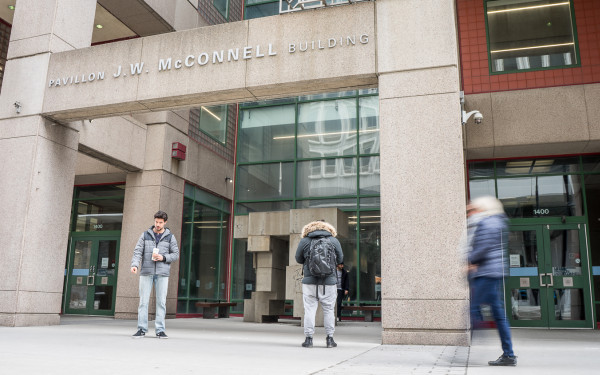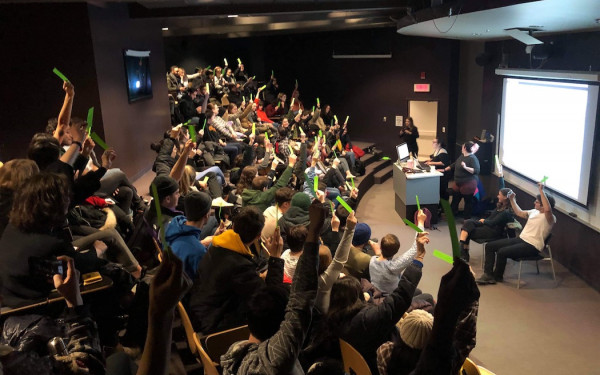Senate: Changes to Student Senate Eligibility Requirements, Discussions Around Fall Reading Week Continue
Ad Hoc Committees Stress Academic Success
Most of Friday’s Senate meeting orbited around discussions on the possibility of a fall reading week and amendments to the requirements of eligibility for students to sit on Senate. Ad hoc committees stressed that both would improve students’ academic success.
Interim President Graham Carr also announced that classes will be cancelled between 11:45 a.m. and 4 p.m. on Sept. 27, coinciding with the global climate strike taking place to support climate action. Classes will resume thereafter and the university will remain open.
Classes will not be cancelled for the federal elections on Oct. 21 like they were for the provincial elections, but students will be able to vote on campus.
The Senate moved to support allowing independent undergraduate students and students in conditional standing to sit on Senate starting in 2020 in two separate motions.
These students will have to be registered for six credits and those in conditional standing must get approval from their academic advisors.
No more than two independent students will be able to sit on Senate and independent graduates are barred from the positions.
Though the Senate adopted the motion, Concordia’s Board of Governors will get the final say on whether or not these requirements stand.
In regards to changing the requirements around academic standings, Mikaela Clark-Gardner—one of the members of the ad hoc committee presenting the motion—said students should democratically be able to choose who represents them and that barring certain students from the position is discriminatory.
She added that students are going through the Concordia Student Union’s appointment process, which looks at achievements and strengths in a holistic manner.
“It’s not limited to grades, it allows students to articulate their experience and skill sets and commitment to how they’d like to positively contribute to Concordia’s Senate,” she said.
Several senators argued that if a student is in poor academic standing, someone else could be better suited for the task. Others refuted by saying that students who are struggling offer a valuable perspective.
The motion to allow students in conditional standing to participate in the Senate passed with 28 votes for and five against.
However, several were strongly against giving independent students seats on Senate as they represent a small portion of the student population and “wouldn’t be fit to make decisions on faculties and programs.”
CSU General Coordinator Chris Kalafitidis stressed that independent students have the advantage of being able to move from one faculty to another and would have a more well-rounded view of how the university works.
“We have to stop changing these rules just because some people want to be on Senate. These rules are bigger than all of us,” said Senator Ali Akgunduz. “If you want to serve in the Senate, just deserve it and these Senate rules are the bare minimum.”
Undergraduate student representative, Marlena Valenta, stressed that increased flexibility won’t turn the Senate into a revolving door as the appointment process will remain rigorous.
The motion to allow independent students passed with 17 votes for and 14 against.
“It’s not limited to grades, it allows students to articulate their experience and skill sets and commitment to how they’d like to positively contribute to Concordia’s Senate.” — Mikaela Clark-Gardner
Fall Reading Week
Interim Provost Anne Whitelaw gave updates on the ad hoc committee tasked with researching the feasibility of a fall reading week, though no official proposal has been filed.
The committee was formed at the request of Concordia’s former president Alan Shepard and has met three times over the summer to evaluate the benefits of a fall reading week, its timing and length, and the scheduling constraints they face.
Whitelaw said the committee is weighing two possibilities to squeeze in a reading week while respecting the minimum amount of hours for accredited programs; either to begin classes a week before Labour Day or to reduce the fall term to 12 weeks instead of 13.
She argued that starting the school year a week earlier would be the easiest solution, though it could impact those who are coming to Concordia from outside the city who would have to pay an extra month’s rent. In any case, Aug. 28 would be the earliest possible start date.
The committee is also considering a move to a 12-week model after looking at Ontario schools that have adopted it. Whiteman said there are many benefits to this model “in terms of student learning benefits as an outcome.” But, they are still waiting for a report.
The committee will hold more consultations, collect more data, and possibly create focus groups before bringing forth a full proposal. The CSU will also hold a referendum in support of a fall reading week.
A previous version of this article features a misspelling of Interim Provost Anne Whitelaw’s name in which it reads Anne Whiteman. The Link regrets this error.

_900_600_90.jpg)





